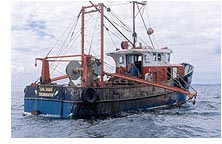|
 This
analysis describes the characteristics and scale of the sea fisheries
sector and its impacts on the delivery of nature conservation objectives
in England. It gives English Nature's objectives for the sector
and sets out our three priority actions for 2004-2007. We also identify
the key organisations and actions needed to influence policy and
its delivery. This
analysis describes the characteristics and scale of the sea fisheries
sector and its impacts on the delivery of nature conservation objectives
in England. It gives English Nature's objectives for the sector
and sets out our three priority actions for 2004-2007. We also identify
the key organisations and actions needed to influence policy and
its delivery.
We outline the roles of the key shapers and players within the
sector. The dominant influences in this sector are the International
Council for the Exploration of the Sea (ICES), Directorates General
(DG) Fisheries and DG Environment of the European Union (EU), the Department of Environment, Food and Rural Affairs (DEFRA), Sea Fisheries
Committees (SFCs) and representative organisations of the fishing
industry.
We examine the key socio-economic and political factors that shape
the sector; these include the social and economic importance of
fishing and ancillary industries which are particularly significant
in some coastal areas of England, the strong market demand for fish,
and the public's perception of the industry in terms of the wider
effects of fishing and overfishing.
We analyse the positive and negative impacts of the sector on nature
conservation; the excessive removal of target and non target species,
increased food for seabirds and other scavengers, alteration of
seabed habitats, and changes in predator/prey relationships.
|

